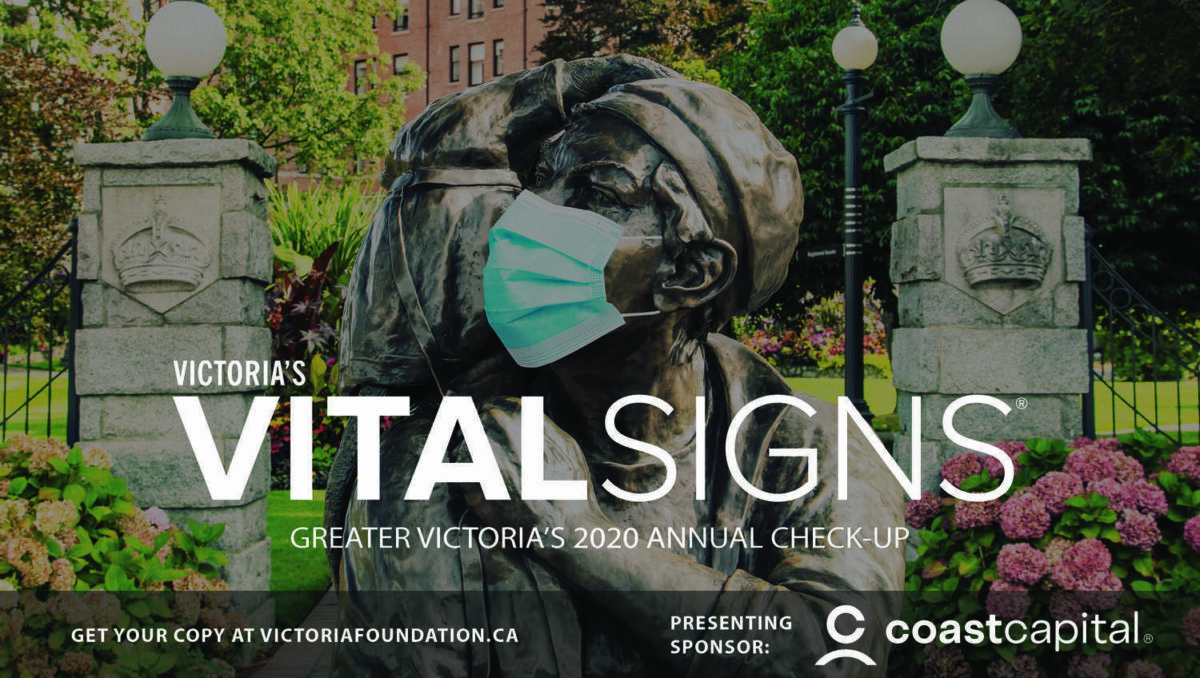
Every year, the Victoria Foundation’s Vital Signs report offers a snapshot of the community. This year, the report found that youth have been disproportionately impacted by COVID-19, in areas including unemployment and mental health.
The report shows that the community is hurting. Across all age groups, 51 per cent of respondents said their mental health declined due to the COVID-19 pandemic and 29 per cent experienced job or income loss.
This year’s new “Pandemic Snapshot” addition to the Vital Signs report also provides statistics for how the pandemic has impacted people of different age groups. People under 30 were more likely to have lost their jobs and faced mental health challenges.
Zahura Ahmed is the grants and youth programs associate at the Victoria Foundation. Ahmed says the Vital Signs findings echo what she has heard from community groups already.
“Especially because of the pandemic, youth are really struggling to get that support they needed from things that were coming up because of the isolation,” Ahmed said.
The survey for the Vital Signs report was conducted by Leger. The survey was answered by 1 793 respondents in Greater Victoria. In their report on youth, Leger separated out the responses of people under 30.
Forty-seven per cent of respondents aged 30 and under reported that they had experienced a job loss or income loss due to COVID-19. For respondents 31 and over, the same metric was almost halved. Only 27 per cent of respondents 31 and over reported job or income loss. Youth were also more likely to have lost their job permanently (25 per cent) compared to respondents aged 31-44 (10 per cent).
Twenty-six per cent of youth indicated COVID-19 was a “major threat” to their personal financial situation.
Youth reported that their mental health is suffering due to COVID-19. 61 per cent of youth said COVID-19 has worsened their mental health. For the 65 and older age group, only 34 per cent agreed.
Youth in Greater Victoria were also less likely to be afraid of contracting or spreading COVID-19. Fifty-five per cent were not concerned that COVID-19 will cause an illness and 26 per cent were not concerned that COVID-19 will cause an illness for other people in their community.
Physical health, however, was actually more likely to have improved among Greater Victoria’s youth when compared to older adults. Twenty-six per cent of youth said the pandemic improved their physical health, whereas the same was true for only 12 per cent of respondents 31 and older.
The Vital Signs report attempts to assess Victoria’s quality of life. The results of the pandemic snapshot were combined with data, statistics, and research on other topics to identify community strengths and key issues.
The Victoria Foundation produces the report every year, with the hope of better informing organizations about how to support the community. This is the 15th year the Victoria Foundation has produced a Vital Signs report.
The three issues ranked as most important by respondents were housing, cost of living, and homelessness. This is a stark difference from 2019, when housing was ranked as the eighth most important issue.
Survey respondents are also asked to grade Victoria’s quality of life across 12 key issue areas and overall. This year, 2019’s B+ dropped to a B. The issue areas that received the lowest grades were housing and opportunities for newcomers and young people. For the latter, Victoria’s grade fell from a B- in 2019 to a D+ this year.
In response to the report and current challenges facing youth, Ahmed hopes to see organizations continue to value youth and their perspectives. In particular, Ahmed said organizations should try to offer more employment opportunities for youth and especially women as they are disproportionately affected by unemployment.
“We know that there are a lot of organizations that are already doing the work,” Ahmed said. “In general, we need to think more about why it is that organizations that are providing this very necessary and needed work might sometimes struggle to find funding and find resources for them to continue doing that work.”
“As a community we need to continue advocating alongside them,” Ahmed said.







